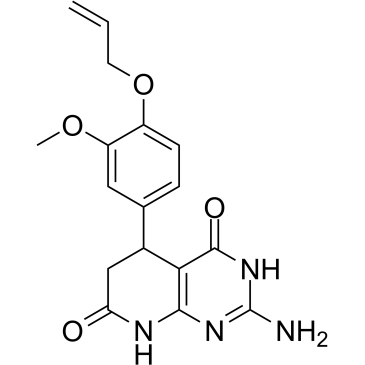PA 8
Modify Date: 2025-09-18 10:52:46

PA 8 structure
|
Common Name | PA 8 | ||
|---|---|---|---|---|
| CAS Number | 878437-15-1 | Molecular Weight | 342.35 | |
| Density | N/A | Boiling Point | N/A | |
| Molecular Formula | C17H18N4O4 | Melting Point | N/A | |
| MSDS | N/A | Flash Point | N/A | |
Use of PA 8PA-8 is a potent, selective and orally active PACAP type I (PAC1) receptor antagonist. PA-8 inhibits the phosphorylation of CREB induced by PACAP in PAC1-, but not VPAC1- or VPAC2-receptor. PA-8 also inhibits PACAP-induced cAMP elevation with an IC50 of 2 nM[1][2]. |
| Name | PA-8 |
|---|
| Description | PA-8 is a potent, selective and orally active PACAP type I (PAC1) receptor antagonist. PA-8 inhibits the phosphorylation of CREB induced by PACAP in PAC1-, but not VPAC1- or VPAC2-receptor. PA-8 also inhibits PACAP-induced cAMP elevation with an IC50 of 2 nM[1][2]. |
|---|---|
| Related Catalog | |
| In Vitro | In PAC1/CHO cells, PA-8 (10 pM to 10 nM; 30 minutes) dose dependently inhibits PACAP (1 nM)-induced CREB phosphorylation. In VPAC1/CHO and VPAC2/CHO cells, PACAP (1 nM) also induced CREB phosphorylation; however, PA-8 (10 pM to 10 nM) does not inhibit PACAP (1 nM)-induced CREB phosphorylation[1]. |
| In Vivo | PA-8 (100 pmol/5 µL; intrathecal injection; once; male ddY mice) treatment inhibits PACAP-induced aversive responses and mechanical allodynia in vivo[1]. PA-8 (3-30 mg/kg, p.o.) treatment results in the dose-dependent attenuation of the second phase of formalin-induced nociceptive responses. PA-8 also inhibits c-fos upregulation in the ipsilateral dorsal horn of the spinal cord[2]. Animal Model: Male ddY mice (6 weeks old) injected with PACAP (100 pmol)[1] Dosage: 100 pmol/5 µL Administration: Intrathecal injection; once Result: Inhibited PACAP-induced aversive responses and mechanical allodynia in vivo. |
| References |
| Molecular Formula | C17H18N4O4 |
|---|---|
| Molecular Weight | 342.35 |